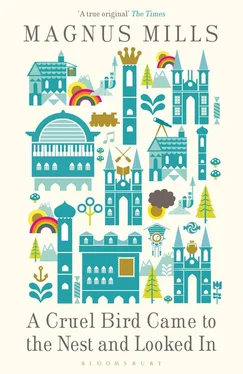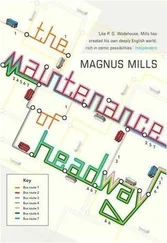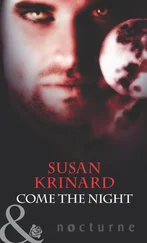The train pulled importantly into the platform, but when it came to a halt I saw that it was completely empty.
Dusk had descended when I returned to the concert hall. The lights in the foyer were glowing dimly, and from inside the auditorium I heard music being played. I looked in and saw Greylag sitting at the piano as if he’d been there all day. He was composing a nocturne by the sound of it, and every so often he would pause and make some changes to his manuscript. It was heartening to know that some things would never change in Greylag’s world. I decided this should be celebrated, so I went to the broom cupboard and collected a bottle of wine and two glasses. (The wine actually belonged half to Sanderling and half to me, but under the circumstances I felt he was hardly in a position to complain if I opened it.) I returned to the auditorium and poured a glass for Greylag and one for myself.
To my surprise Greylag refused his glass.
‘Not when I’m playing, thank you all the same,’ he said. ‘It seems somewhat unprofessional.’
So I sat under the pink chandeliers and drank alone, listening while Greylag resumed work on his nocturne. He was just about finished when Wryneck and Sanderling came back. It was very late and Sanderling looked quite flushed. The pair of them were disconsolate.
‘No luck then?’ I ventured.
‘I’m afraid not,’ replied Wryneck. ‘The trail appears to have gone cold.’
‘We’ve tried everywhere,’ added Sanderling, ‘but nobody’s seen the emperor; not lately anyway.’
‘So what are we going to do?’ I asked.
‘There’s only one solution,’ said Wryneck. ‘We’ll have to find a substitute.’
The cake looked truly magnificent in the early spring sunshine. The restoration work had been completed to a high standard and the results were impressive.
Not a moment too soon, by all accounts.
No one in the empire ever noticed that the stone walls had begun gradually to fade over the years. It had required the eyes of outsiders, of course, to recognise the problem and rectify it. Now that they’d been returned to their original yellow hue we could plainly see the difference. Another decade, apparently, and they would have started to crumble.
Meanwhile, the roof had been cleared of all the dead leaves and other detritus which marred its creamy-white dome.
Now, once again, the cake appeared good enough to eat!
Performances would resume when all the seats had been reinstalled. (Nobody liked the idea of having to stand to watch the orchestra play.)
As the clock struck ten, Shrike opened the register.
‘Let us begin,’ he said. ‘Chancellor of the Exchequer?’
‘Present,’ said Sanderling.
‘Postmaster General?’
‘Present,’ said Whimbrel.
‘Astronomer Royal?’
‘Present,’ I said.
‘Comptroller for the Admiralty?’
‘Present,’ said Smew.
‘Surveyor of the Imperial Works?’
‘Present,’ said Mestolone.
‘Pellitory-of-the-Wall?’
‘Present,’ said Wryneck.
‘Principal Composer to the Imperial Court?’
‘Present,’ said Greylag.
‘His Exalted Highness, the Majestic Emperor of the Realms, Dominions, Colonies and Commonwealth of Greater Fallowfields?’
Shrike paused and waited.
Five minutes went slowly by and nothing happened. Then suddenly there was a huge fuss and kerfuffle outside the door.
‘Let us pass!’ demanded an imperious voice. ‘We are the Player King!’
The author would like to thank Simon Moody
and Mark Pappenheim for their patience.
Magnus Mills is the author of The Restraint of Beasts , which won the McKitterick Prize and was shortlisted for both the Booker Prize and the Whitbread First Novel Award in 1998, and of five other novels, including The Scheme for Full Employment , and the story collection Screwtop Thompson . He lives in London.












